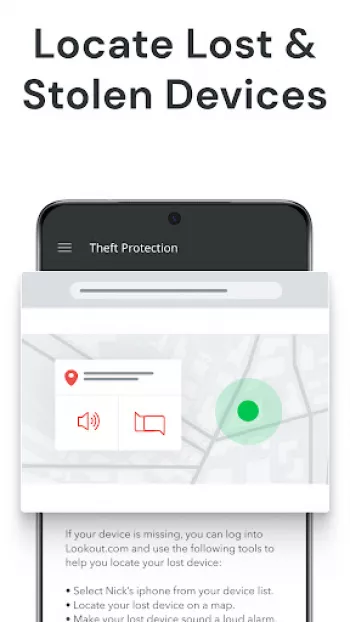Apps Home

Understanding Mobile Security Threats
In today's digital age, mobile security has become a paramount concern for smartphone users globally. The increasing dependency on smartphones for personal and professional use has made them lucrative targets for cybercriminals. Understanding mobile security threats is the first step towards protecting your phone from viruses and spying. The vast array of threats range from traditional viruses and malware to more sophisticated forms of intrusion like spyware and phishing attacks. Malware, a portmanteau of malicious software, is a term that encompasses various harmful programs, including viruses, trojans, and worms designed to damage or exploit devices. These malicious codes often infiltrate your phone through downloading unsuspecting apps or visiting compromised websites. For instance, an innocent-looking app might carry hidden malware that, once installed, can access your personal data, monitor your activities, and even control your device remotely. Spyware, a more clandestine form of malware, silently resides in your device to steal sensitive information without your awareness. It tracks your keystrokes, app usage, and sometimes even your geographical location. This kind of intrusion is primarily used for illegal surveillance and information theft, posing a significant threat to your privacy. Phishing attacks target individuals by tricking them into providing sensitive information, typically via email or fake websites that mimic legitimate ones. These phishing scams can lead to severe identity theft issues, costing individuals their personal data and financial resources. A significant risk associated with these threats is the potential breach of identity data, which emphasizes the need for a robust security system that provides alerts whenever a data breach occurs. Comprehensive protection against these threats involves using antivirus and mobile security applications, which can continuously scan for and eliminate viruses and malware. Moreover, tools like Privacy Advisors can help you understand what personal information your apps can access, further minimizing exposure to potential threats.
Strategies to Safeguard Against Phone Viruses
Safeguarding against phone viruses requires a multi-layered strategy that combines good security practices and the use of advanced technological tools. One of the fundamental strategies is to ensure all your apps and the operating system are up-to-date. Developers regularly release updates to patch vulnerabilities that hackers could exploit, and by keeping your software current, you reduce the risk of exploitation. Strong antivirus software should be a critical component of your mobile security strategy. Such software not only provides real-time protection by scanning for viruses and malware but also offers features like regular virus database updates, ensuring that your security software can identify and neutralize the latest threats effectively. A reputable antivirus software will scan every new app you download and periodically examine your system for signs of malware. Encrypting your data adds another level of protection. Data encryption transforms your information into unreadable code that can only be deciphered with the correct decryption key, rendering it useless to cybercriminals if intercepted. Moreover, defining safe browsing habits is essential. Using secure, verified sites and avoiding clicking on unknown links or downloading adjustments from untrustworthy sources minimizes the chances of encountering harmful software. Incorporating tools like Privacy Guard and Safe Browsing features into your mobile usage can prevent your device from accessing known malicious sites. Mobile security apps often provide features like System Advisors that inspect your device for root detections, ensuring the operating system functions correctly and hasn't been tampered with. In addition, using VPN services can help protect your identity and data as you browse by encrypting your internet connection, making it difficult for cybercriminals to intercept your communications or monitor your browsing activity. One of the underrated strategies for virus protection includes being mindful of permissions requested by apps. Reviewing these requests and allowing only necessary permissions can significantly impact your privacy since it limits the potential access malware has to your data.
Best Practices for Maintaining Privacy and Preventing Spying
Maintaining privacy and preventing spying on your mobile device demands diligence and a series of best practices. Firstly, understanding permissions is crucial. Many apps request access to information or functions beyond what is necessary for their operation. Regularly reviewing and managing app permissions ensure that you are only allowing trusted apps to access sensitive data. Furthermore, the importance of securing your device with a strong password cannot be overstated. A robust password or biometrics, like fingerprint or facial recognition, forms the first line of defense against unauthorized access. In addition to passwords, enabling two-factor authentication (2FA) adds an extra security layer by requiring a second verification, typically sent to your registered contact. This method ensures that even if your password is compromised, unauthorized individuals cannot access your device. Preventing spying also involves being cautious about connecting to public Wi-Fi networks, which can be hotspots for data interception. Using Safe Wi-Fi features provided by mobile security apps can protect your device from phishing attacks and other intrusive spying attempts when connected to such networks. Monitoring your device's behavior can help detect unusual activities that might indicate spying or malware presence. For example, unexpected data usage spikes, unusual pop-ups, or faster battery drain could be signs that an app is spying on you. Many security apps offer Theft Alerts, which notify you of suspicious behaviors, potentially indicating that your phone might be compromised. Additionally, privacy-centric features like Identity Monitoring Services can alert you if your personal details appear on the dark web, thus giving you a heads-up to take proactive steps to protect your identity. Engaging with these practices requires vigilance, but they play an essential role in ensuring your data privacy and minimizing the potential for spying on your smartphone.
The Role of Mobile Security Software in Protecting Your Device
Mobile security software plays a pivotal role in the overarching strategy of protecting your device from both viruses and spying. Its primary function is to provide real-time protection against a wide spectrum of threats, including viruses, malware, spyware, and identity theft attempts. Among the key features of top-tier mobile security software is the Virus Scanner, which operates continuously over the air, ensuring your device remains free from harmful infections. This feature not only scans downloads but also scrutinizes apps and files stored on the device, including those in messaging apps that might be carriers of hidden threats. One of the unique features of advanced security software is the ability to map the location of your device and trigger alarms if it's lost. This capability is particularly useful for retrieving misplaced devices and offers peace of mind by saving your device's location when the battery is low, ensuring that you have a last-known location logged. Another significant capability is the System Advisor, which inspects your mobile device to ensure that the operating system functions correctly, mitigating any disruptions caused by unauthorized root access or malware. Mobile security software also excels in remote device management, offering features to lock and wipe data if the phone is lost or stolen, thereby preventing unauthorized access to sensitive information. The integration of secure browsing and Wi-Fi protection features further fortifies your device against data breaches and phishing attempts. By using a VPN to scan every URL visited, these tools help detect online threats, alerting you about potentially harmful sites that could compromise your data and privacy. Comprehensive mobile security solutions often provide Privacy Advisors, which allow you to monitor and control the personal information your apps can access, greatly reducing the risk of privacy invasion. Collectively, these features and functions illustrate how essential security software is in maintaining the security and integrity of your smartphone, protecting against a myriad of digital threats.
The Future of Mobile Security and Emerging Technologies
The future of mobile security is being shaped by the rapid advancement of technology and the ever-evolving techniques employed by cybercriminals. As smartphones become more integral to our daily lives, securing them is paramount, warranting innovations in mobile security solutions and practices. Emerging technologies such as Artificial Intelligence (AI) and Machine Learning (ML) are poised to revolutionize the security landscape. AI and ML algorithms can analyze vast amounts of data to identify unusual patterns that signify malware or spying attempts, effectively predicting and neutralizing threats before they can cause harm. As these technologies become more advanced, they offer the potential to significantly enhance the accuracy and efficiency of mobile security applications. Cloud-based security solutions are also becoming increasingly common due to their ability to offer real-time updates and protection across multiple devices, ensuring that your security software is always up-to-date with the latest threat intelligence without requiring user intervention. Additionally, blockchain technology is beginning to show promise in mobile security applications by providing a decentralized method of securely managing and verifying user identities and credentials. As IoT devices proliferate and integrate with smartphones, security solutions that can seamlessly protect a broad ecosystem of interconnected devices will become imperative. Moreover, emerging trends such as biometrics are advancing beyond fingerprint and facial recognition to include behaviors like gait and voice patterns, presenting new frontiers in personal device security. Overall, the future of mobile security lies in the agile adaptation to these emerging technologies while adhering to best practices. Users are encouraged to remain informed about these innovations and understand how they can enhance their security posture. Downloading robust security apps, like the recently rebranded F-Secure Mobile Security for Android, can ensure comprehensive protection while keeping abreast of the latest security features and updates. For Android users, Download for Android.
Share Your Opinion
Your Email Will Not Be Published.
All Rights Reserved © Apps Home 2025
































C Moss
I was distraught because I couldn't figure out why my VPN wouldn't connect and after submitting a request for help, the representative outline 2 di...
Phil Ways
VPN was causing major connectivity problems. I could not use other apps while connected to the VPN. I have had premium for some time; this was a fi...
Obito Uchiha
when the app auto updates for latest threats, it begins to scan apps in the background, by itself. without giving me a notification. thus, my batte...
Timothy W Larson
App gets the job done, mostly. Easy to navigate and use UI. There's only one annoying issue, and it's a big one: Following their acquisition and re...
Linda Corbin
I've used them for years, had premium, had to switch to free during covid. Went to go back to premium and can't pay monthly anymore $2.99/mo..and m...